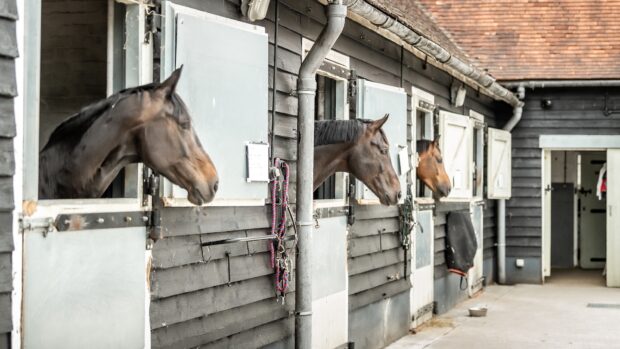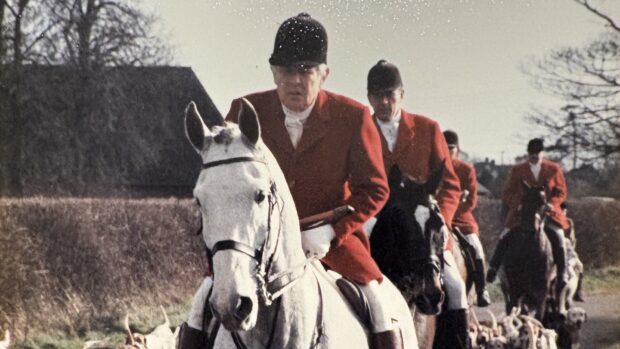A Shetland pony who was abandoned in a field while suffering with strangles is being nursed back to health at The Horse Trust.
It is thought the skewbald mare had had the infectious illness untreated for at least two weeks by the time she was discovered by a member of the public in a field in Buckinghamshire.
Reading-based rescue charity Saving Abandoned Fly-grazing Equines (SAFE) was the first to come to the pony’s aid, arranging treatment and transport from the site to the Royal Veterinary College (RVC). The Horse Trust — Britain’s oldest equine charity — later offered to take on her care.
“I knew straight away she had strangles, so we arranged for our vet to diagnose and refer her,” said SAFE trustee Alison. “She’s feisty and a survivor and was over the temperature stage when we found her, so she had been fighting it for a couple of weeks by herself.”
After two weeks of treatment at the RVC, the Shetland arrived at The Horse Trust on Friday (11 August).
“She’s going to be fine, she’s very pretty and full of life and is a real character,” said Horse Trust chief executive Jeanette Allen. “She’s already had a good gallop about her new home and is eating and drinking very well.”
Jeanette added that the mare will have to stay in isolation for a number of weeks to ensure she has not become a strangles carrier and to protect the existing herd, many of whom are vulnerable and elderly.
“Even if she has become a carrier, that’s fine, there is treatment,” she added. “She’s going to be perfectly happy and healthy. What was sad was that irresponsible owners left her to the stage where she had abscesses bursting— some close to her eyes — which is unforgivable. She could have been treated with antibiotics but instead she had to go through that.
“She also had ringworm, which would have made her very itchy and uncomfortable.”

The Horse Trust has been funding strangles research for many years and is launching a strangles surveillance programme in partnership with the Animal Health Trust (AHT).
Led by Dr Richard Newton, the new system will be the first to accurately monitor the spread of the infection through the UK horse population.
“It will help scientists to more closely understand if there any links between outbreaks and new strains of the bacterium arising and in time will facilitate the monitoring of any strangles control initiatives such as future vaccines,” Jeanette said.
She also hopes the horsey public can be encouraged to take a “less hysterical” approach to the much-feared illness, which can be easily managed with “basic bio-security”.
“It’s incredibly rare for a horse to die of strangles, it’s just very unpleasant to go through,” said Jeanette. “Unfortunately there can be a trend to victimise or vilify yards or owners with an infected horse or pony and this is not at all helpful.
“It’s not airborne and simple biosecurity measures such as changing clothes, washing boots in Vircon and wearing disposable gloves can help make sure it doesn’t spread.
“This beautiful little Shetland is a perfect example of just how treatable strangles can be, that even with such advanced infection she is almost certainly going to live a happy, healthy and hopefully long life thanks to proper treatment and simply infection control procedures,” she added.
“Our herd has many veterans who could be more vulnerable than most to infection however thanks to expert advice we have absolutely no hesitation in taking this lovely girl in and still keeping the rest of our horses safe until she is cleared to join the rest of our Skewbald Shetland Squadron here at The Horse Trust!”
SAFE, the charity which first stepped-in to help the Shetland, is organising two fundraisers to build a new quarantine box, to help more equines who need isolation.

Strangles survey reveals spread and ignorance of disease
An online survey for Strangles Awareness Week has

Breakthrough in fight against strangles
Scientists say sequencing the genome of streptococcus equi

Shetland pony fosters a lamb
A hungry lamb in Powys has found an
A family fun day — with pony rides, tombola, dog show, trade stands, barbecue and beer tent — takes place at Cantley Park, Wokingham on September 2 with free entry. Email zoe@safe-horses.org.uk with enquiries.
A dinner dance is also taking place on Saturday, 14 October at Windlesham Golf Club, Bagshot. Tickets are £55 and available from Kelly@safe-horses.org.uk or call 07502 268691
For all the latest news analysis, competition reports, interviews, features and much more, don’t miss Horse & Hound magazine, on sale every Thursday.




